- Home
- Karen Kingsbury
When Joy Came to Stay Page 2
When Joy Came to Stay Read online
Page 2
Maggie drew a steadying breath, glanced around the newsroom, and saw that the office was full of more reporters than usual for a Wednesday. Slow news day. Great. When news was slow her column got front-page billing, and the one she was writing for tomorrow’s paper was bound to gain attention: “The Real Abuse of Abused Children.” She let her eyes run down the page. This column would be clipped out of papers around the city, tacked to office walls, and mailed to the Social Services department by irate citizens. She would receive dozens of letters, and the paper would receive more, but none of that bothered Maggie.
She’d gotten the job at the Gazette more than two years earlier and she’d been churning out her column, “Maggie’s Mind,” five days a week since. She’d developed a reputation, a persona, that a segment of the public hated and a greater segment couldn’t seem to get enough of. People said she put words to the thoughts and conversations that took place in a majority of homes in their area and around the country. The conservative homes. The people who voted against tax hikes and partial-birth abortions; people who wanted tougher prisons and longer sentences, and prayer in public schools. The segment of the population who wanted a return to family-friendly governing.
For those people, she was a welcome voice. The voice of morality in a time and place where few in the paper, or anywhere in the media for that matter, seemed committed to speaking on their behalf. Most Gazette readers loved Maggie. From the beginning they had applauded her, and a few months after starting at the paper the editorial staff had been forced to hire an assistant simply to weed through the mail generated by Maggie’s efforts.
“You know, Maggie girl, I think you’ve really got something with that column of yours,” her editor had told her more than once. “It’s disconcerting, really. Like the rest of us are writing for some small special interest group, but you…ah, Maggie, you’re writing for them. The moral majority.”
Maggie knew the paper’s editorial board was glad to have her on staff, even if many of her peers disagreed with her political views. But no one was more proud than her husband, Ben, an assistant district attorney who was also president of the Cleveland Chamber of Commerce. After nearly seven years of marriage, Ben was still in love with her; she had no doubts. Even now, when they had to search awkwardly for things to talk about and her attitude toward him was vastly different than a year ago, he would still walk over burning coals to prove his love.
Because he doesn’t know the truth.
No. Not now, Maggie thought. Not with a column to finish.
Among the silent voices that taunted her these days was her own, and at times like this she was her worst enemy. If Ben knew the truth about her past, if he knew the real person he’d married, he would do what Joseph set out to do to Mary two thousand years ago: divorce her quietly and leave town on the first passing donkey.
“How’s it coming, Mag?” It was Ron Kendall, managing editor, and he shouted the question from twenty feet away where the editors’ desks formed an imposing island in the middle of the newsroom.
“Fine. I’ll file in ten minutes.”
“I might need it for page one. Give me a liner.” Ron leaned back in his chair for a clearer view of Maggie’s face.
She glanced at her screen and summed up her column. “Woman’s lawsuit demands changes in the way abused children are handled by Social Services.”
“Good. Got it.” Ron returned to the task at hand—planning the paper’s front page.
There were those at the paper who disliked Ron, but Maggie wasn’t among them. Built like a linebacker with a mass of unkempt white hair and a perpetual two-day beard, the man’s voice rang through the newsroom whenever a deadline was missed or an untruth reported in print. But deep down, beneath his work face, Ron Kendall was the last of a dying breed of editors, a churchgoing conservative who cherished his role in shaping and reporting the news of Cleveland.
Once Maggie ran into Ron at a dinner raising money for the city’s rescue mission. Near the end of the evening, he pulled her aside.
“Someday you’re going to get offers to leave us.” The flint was missing from his eyes and in its place was a sparkle that couldn’t be contrived. “Just remember this: Losing you would be like losing one of my arms.” He patted her shoulder. “Don’t ever leave us, Maggie. We need you.”
That was a year ago, and Maggie was surprised to find Ron had been right. Offers had come from Los Angeles, Dallas, even New York. Editors might have enjoyed staffing their papers with liberal-minded news seekers, but nothing met the readers’ appetite like a conservative columnist—and those who were well liked were in high demand.
Maggie had done what Ron asked and stayed. She liked Cleveland and their church friends at Cleveland Community. Besides, Ben’s job was there.
If they knew the truth about me…Maggie closed her eyes. They’d fire me in a heartbeat. I’d have no marriage, no column…
Stop it! Stay focused! That was seven years ago, Maggie.
But Maggie knew it didn’t matter how many years had slipped by. She would never get past the truth. And there would never be any way she could tell Ben.
Let no falsehood come from your mouth, but only that which is…
There it was again. The familiar calm, still voice…and with it a strange feeling of impending doom so great Maggie had to fight the urge to take cover. Her eyes flew open and she moved her hands into position at her keyboard. “Let’s get this thing done,” she hissed through clenched teeth. This was no time for strange, scriptural warnings about lie telling. She had a deadline to meet.
What was done was done.
Help me concentrate, God. Help me forget about what’s behind; help me look ahead without this…whatever it is that wants to consume me.
Her head cleared, and she studied her computer screen once more.
Her column that day was based on a lawsuit filed against the city’s Social Services department by a Cleveland woman contesting that the department was to blame for destroying her son. She’d adopted the boy when he was five years old. Over the next four years he’d been diagnosed with a host of disorders all attesting to the fact that he was unmanageable, unable to attach emotionally, and inappropriately aggressive toward her other children. Finally, the woman felt forced to turn the then nine-year-old back over to Social Services.
The lawsuit shone a flashlight of concern on the Social Services department, which still held to the notion that children should be raised by their parents whenever possible, regardless of the situation in the home. The woman contended that if Social Services had removed the boy from his birth mother sooner, he wouldn’t have been so badly scarred emotionally.
Maggie’s heart ached with understanding.
She and Ben were foster parents, currently of seven-year-old twin boys. Their mother was an alcoholic, their father dangerously violent. Still, Maggie knew that one day, long after the boys had bonded with her and Ben, they would be returned to their birth mother. Stories like the one she was writing about were tragically common, and Maggie hoped her words might touch a nerve across the city. Perhaps if enough people demanded change…
She scanned what she’d just written.
The way the department operates today a child may be kept hostage in closets while Mom sells herself for drugs; he can be beaten, mocked, and left to sleep in urine-soaked rags, yet that type of home life is deemed best for the child. The solution is obvious. We must fight to see the system changed and demand that such children be removed from the home the first time harmful circumstances come to light—while the child is still young enough to find an adoption placement.
The statistics tell the story. With each passing year, the odds of a troubled child finding an adoptive home diminish by 20 percent. In the first year, the chances of adoption are brilliantly high. Even at age two most children will find permanent, loving homes. But many children removed from abusive homes are not released for adoption until age five, and often much later. What happens to these children?
Too often they are left to squander their baby years in abusive situations and temporary foster homes, moving every few months while Mom and Dad dry out or serve jail time. In the process, they become emotionally “damaged goods”: children too old and too jaded ever to fit into a loving, adoptive family. In cases like these, we have only one place to point the finger for the tragic consequences: The archaic rules of the Social Services department.
I thank God for people like Mrs. Werdemeir, whose lawsuit finally exposes the type of tragedy that has gone on far too long. The tragedy of thinking that no matter the situation, a child belongs with his mother.
Tonight when you kneel beside the bed of your little one, remember those babies out there sleeping in closets. And pray that God will change the minds of those who might make a difference.
Suddenly Maggie’s mind drifted, and her eyes jumped back a sentence: Your little ones…little ones…little ones…kneel beside the bed of your little ones.…
Her eyes grew wet and the words faded. What about us, Lord? Where are the little ones we’ve prayed for? Haven’t we tried? Haven’t we? She remembered the testing, the experimental procedures they’d participated in, the drug therapy and nutrition programs that were supposed to help her get pregnant. A single tear slid down her cheek into her mouth. It tasted bitter, like it had come from some place deep and forbidden in her soul, and she wiped at it in frustration.
Nothing had worked.
Even now her arms ached for the children they didn’t have. Foster kids, yes…but no babies to pray over, no little ones to be thankful for. Why, Lord? It’s been seven years.…
You had your chance. You don’t deserve a child of your own.
The truth hit hard, and her breath caught in her throat.
Maggie blinked twice, and the taunting voice faded. She quickly included a footnote at the bottom of her column advising readers that there would be more information in the coming weeks and months on the issue of abused and forgotten children in the Social Services system. She saved her changes and sent the file to Ron’s computer.
“It’s in.” She spoke loudly, and when she saw her editor nod, she turned her attention back to the now blank computer screen. Seconds passed, and a face began taking shape. The newsroom noise faded as the picture on the screen grew clearer, and suddenly Maggie could make out the girl’s features…her pretty, innocent face; her lovely, questioning eyes.
Do you know where my mama is? the girl seemed to ask.
Maggie wanted to shout at the image, but she blinked twice and before her mind could give her mouth permission to speak, the girl disappeared.
It was her of course—the same girl every time, every day She saw the child everywhere, even in her dreams.
The girl’s presence had been a constant for nearly a year, making it difficult for Maggie to think of anything else. As a result, the days were no longer consumed with her work as a columnist, her role as a foster mother, or her duties as the wife of an important lawyer and civic leader. No, each day had become consumed with the idea that one day—perhaps not too far off—the little girl would not fade into air.
One day, the girl would be real.
The visions of the blond child had pushed Maggie to the edge of insanity. And with them came something else that filled Maggie’s mind even now, a darkness that threatened to destroy her, to leave her locked in a padded cell, wrapped in a straight jacket. Or worse.
The problem wasn’t so much that she was misplacing her car keys more often than usual or forgetting dentist appointments or leaving cold milk in the pantry by mistake or seeing imaginary little girls every time she turned around. It was all of that, yes, but it was something more that made her truly question her sanity. It was the certain feeling that something hideously dark and possibly deadly—something that now seemed closely linked to her secret—was closing in on her.
Something from which she couldn’t escape.
A chill ran down Maggie’s spine; the secret was no longer something she could ignore, something she might pretend had never happened. It didn’t matter whether she acknowledged it or opened it and laid it on the floor for everyone to look at.
It simply was.
Indeed, its presence had become a living, breathing entity It was the embodiment of darkness that lay beside her at night and followed her through the making of beds and breakfast and daily appointments in the morning. It sat next to her in the car, breathing threats of destruction should anyone find out the truth—
Stop this! You’re making yourself crazy!
Maggie pushed away from her desk and gathered her things. Fresh air, that’s what she needed. Maybe a walk through the park. She glanced at a stack of magazines on her desk and did a double take. There she was again! Gracing the cover, looking directly at Maggie…the same little girl.
Then in an instant, she was gone.
Air released from Maggie’s lungs like a withering party balloon.
Yes, she was losing it—free-falling over the canyon’s edge—and there was nothing she could do to prevent the coming crash. She wanted help, truly she did, but there wasn’t anywhere she could turn, no one to talk to.
No one who would believe that Maggie Stovall was having a problem she couldn’t handle by herself.
Finally, desperate, she’d placed her name in the offering bucket when the pastor had asked which women would like prayer from an older, senior Christian. Maggie didn’t know if it would help, but it couldn’t hurt. And it was better than facing someone with the truth.
She headed for her car.
How had things gotten so bad? Years ago she would have had two or three days a month like this and called it depression. Not that she told anyone how she was feeling, even back then. She was a Christian after all, and Christians—good Christians like her and Ben—did not suffer from depression. At least not as far as Maggie could tell. But this…this thing that haunted her now was beyond depression.
Far beyond it.
This was the kind of thing that sent people packing to psychiatric wards.
Two
AMANDA JOY SAT HUDDLED ON A NARROW BED, LEANING AGAINST the chilly wall of the third house she’d lived in that month. The silence was scary, like in the movies before something bad happened…but then she was only seven, and lots of things seemed scary. Especially since coming to the Graystone house.
Footsteps echoed in the distance, and Amanda gulped. Mrs. Graystone was awake, and that meant she’d be coming to check on her. Pushing herself off the bed, Amanda yanked on the covers and straightened the sheets. Beds had to be neat or…
Amanda didn’t want to think about it.
Maybe there was another place she could go, some other foster family who wanted a little girl for a while. She tugged on the bedspread as she remembered the house she’d stayed at just after summer. Her social worker had called it a mistake, a bad placement. Five days later Amanda was packed and sent to a home five miles south, a working farm with three teenage boys.
She shuddered at the memory.
The boys’ parents wanted a foster girl to give the missus a hand with laundry and indoor chores. But while she did up dishes or folded laundry the boys teased her until she was afraid to get dressed or take a shower. Two weeks later the mister found her in the barn, hands tied behind her back with baling twine. Her shirt lay in a rumpled heap on the ground, and the boys were taking turns poking at her, threatening to do terrible things to her if she screamed.
The boys received a whipping from their pa, and she escaped with her social worker before dinnertime.
She didn’t know what she would have done without her social worker. For a moment, Amanda forgot about the chores and sat slowly on the corner of her bed. Kathy Garrett.
In some ways Kathy was more like a mother than anyone she’d ever known. Anyone except the Brownells.
The Brownells had been Amanda’s only real parents. They adopted her as a baby and gave her a wonderful life for five short years.
Amanda slipped off the mattress and lifted the plain, gray bedskirt, poking her head under the bed. There it was. Gently she pulled out a brown paper bag, opened it, and sat cross-legged on the floor, staring at the contents inside. A photograph of her with the Brownells, three folded-up awards she’d won in school, a bracelet she’d found in the lunchroom the year before. She plucked out the picture and stared hard at it. The checkered dress she’d worn that year was a hand-me-down from the neighbors. All the girls in kindergarten had laughed at it, but Amanda figured out how to make them stop. She prayed for them.
She’d knelt beside her bed at the Brownells and prayed. “Dear Jesus, help those girls in my class be nice. Because they don’t have happy hearts, at least I don’t think so.”
Neither did Mrs. Graystone. Which was why Amanda had been praying for her, too. She sighed and set the photograph back in the sack. As she peered inside, her eyes fell on the yellowish newspaper article.
Amanda pulled it out and opened it carefully.
She couldn’t read very well, but she’d read the article often enough to know what it said. It was a news report of the accident that killed the Brownells.
“Icy tree limb lands on car, kills Woodland couple,” the big words on top yelled out.
Amanda felt tears stinging her eyes. The smaller letters said how the Brownells had a five-year-old daughter. But they didn’t say there was no one for her to live with once the Brownells were gone.
She remembered meeting Kathy Garrett for the first time at school that afternoon—the day of the accident. Kathy told Amanda that she had known her as a little baby and that she had helped the Brownells with the adoption. At first it had been nice, sitting in the office talking with the pretty lady. But then Kathy told her about the accident and after that her tummy had felt sick inside.

 Shades of Blue
Shades of Blue Divine
Divine Forever
Forever Summer
Summer The Snake and the Spider
The Snake and the Spider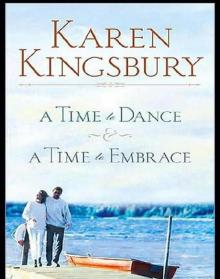 A Time to Dance
A Time to Dance Remember Tuesday Morning
Remember Tuesday Morning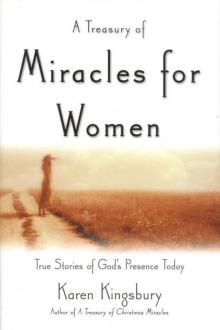 A Treasury of Miracles for Women
A Treasury of Miracles for Women Like Dandelion Dust
Like Dandelion Dust Brush of Wings
Brush of Wings The Tuesday Morning Collection
The Tuesday Morning Collection A Moment of Weakness
A Moment of Weakness Ever After
Ever After This Side of Heaven
This Side of Heaven Unlocked: A Love Story
Unlocked: A Love Story Take One
Take One The Red Gloves Collection
The Red Gloves Collection To the Moon and Back
To the Moon and Back Just Beyond the Clouds
Just Beyond the Clouds Oceans Apart
Oceans Apart A Baxter Family Christmas
A Baxter Family Christmas Fame
Fame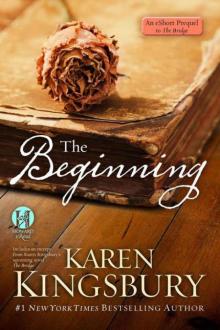 The Beginning
The Beginning On Every Side
On Every Side Gideon's Gift
Gideon's Gift Forgiven
Forgiven A Kingsbury Collection
A Kingsbury Collection Found
Found Family
Family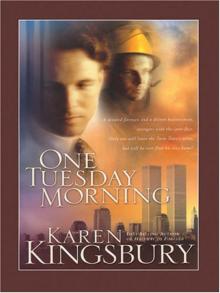 One Tuesday Morning
One Tuesday Morning Someday
Someday Take Three
Take Three Beyond Tuesday Morning
Beyond Tuesday Morning Unlocked
Unlocked Take Four
Take Four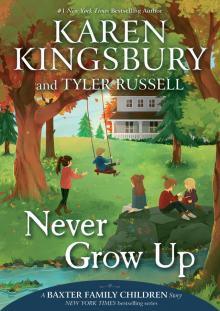 Never Grow Up
Never Grow Up Where Yesterday Lives
Where Yesterday Lives Two Weeks
Two Weeks When Joy Came to Stay
When Joy Came to Stay Halfway to Forever
Halfway to Forever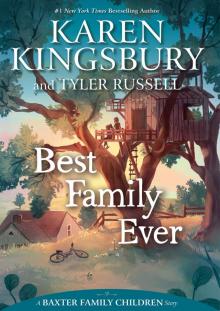 Best Family Ever
Best Family Ever Sunrise
Sunrise Angels Walking
Angels Walking A Treasury of Miracles for Friends
A Treasury of Miracles for Friends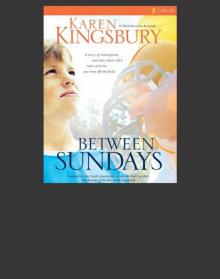 Between Sundays
Between Sundays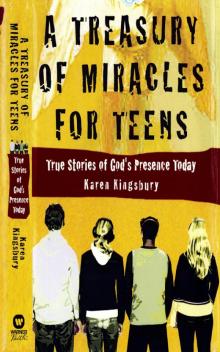 A Treasury of Miracles for Teens
A Treasury of Miracles for Teens A Thousand Tomorrows / Just Beyond the Clouds
A Thousand Tomorrows / Just Beyond the Clouds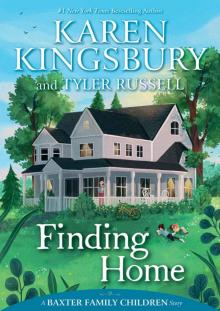 Finding Home (A Baxter Family Children Story Book 2)
Finding Home (A Baxter Family Children Story Book 2) Waiting for Morning
Waiting for Morning Chasing Sunsets
Chasing Sunsets Two Weeks: A Novel (The Baxter Family)
Two Weeks: A Novel (The Baxter Family) Coming Home
Coming Home Final Vows
Final Vows Sunset
Sunset Even Now
Even Now Fifteen Minutes: A Novel
Fifteen Minutes: A Novel Love Story
Love Story The Bridge: A Novel
The Bridge: A Novel One Tuesday Morning & Beyond Tuesday Morning Compilation
One Tuesday Morning & Beyond Tuesday Morning Compilation Truly, Madly, Deeply
Truly, Madly, Deeply The Chance: A Novel
The Chance: A Novel A Brush of Wings
A Brush of Wings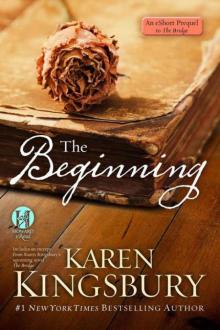 The Beginning: An eShort Prequel to the Bridge
The Beginning: An eShort Prequel to the Bridge A Thousand Tomorrows & Just Beyond The Clouds Omnibus
A Thousand Tomorrows & Just Beyond The Clouds Omnibus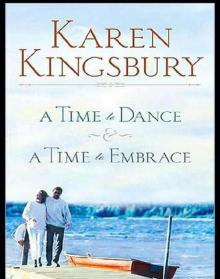 A Time to Dance/A Time to Embrace
A Time to Dance/A Time to Embrace In This Moment
In This Moment Rejoice
Rejoice Coming Home: A Story of Undying Hope
Coming Home: A Story of Undying Hope